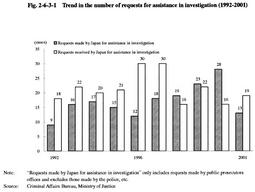| Previous Next Index Image Index Year Selection | |
|
|
1 Assistance in investigation, etc. (1) International cooperation for assistance in investigation If any evidence necessary for the investigation (including supplementary investigation for trial) on a criminal case in Japan exists in a foreign country, Japan shall in principle request assistance in investigation by means of comity of nations through diplomatic channels. If Japan is requested by a foreign country to provide evidence necessary for the investigation of a criminal case in the foreign country, Japan provides assistance in investigation in accordance with the requirements and procedures provided in the Law for International Assistance in Investigation (Law No. 69 of 1980) under the guarantee of reciprocity, even to foreign countries that have not concluded treaties on assistance with Japan.
Under the multilateral treaties that have recently been developed to deal with transnational crimes, it is provided that the Contracting States shall provide one another with the maximum assistance in investigation, prosecution and judicial proceedings on certain offenses that are stipulated in the treaties. With the aim of achieving more effective assistance, these treaties further require the Contracting States to send and receive requests for assistance and exchange communications to that end through the predetermined "competent national authorities", in addition to the diplomatic channels ("U.N. Convention against Transnational Organized Crime", etc. referred to in Section 1 of this chapter ). Bilateral treaties on assistance in investigation often include provisions that are designed to ensure that assistance will be promptly and surely provided, such as the designation of the "central authorities" and the relaxation of the conditions for providing assistance. Japan has not concluded such a bilateral treaty with any foreign country, but has been negotiating for the conclusion of a treaty with the United States since 1999. (2) Request from Japan to foreign countries for assistance in investigation, etc. When requesting assistance from a foreign country in collecting evidence necessary for the investigation (including supplementary investigation for trial) of a criminal case in Japan, the public prosecutors office or the police, etc. makes such request through the diplomatic channels.
When the public prosecutors office makes a request for assistance, the request is generally referred from the public prosecutors office to the Ministry of Justice, the Ministry of Foreign Affairs, the Japanese diplomatic establishments in the foreign country, and finally to the Ministry of Foreign Affairs of the foreign country. In the case of a request made by the police, etc., it is referred from the prefectural police department to the National Police Agency, the Ministry of Foreign Affairs, the Japanese diplomatic establishments in the foreign country, and finally to the Ministry of Foreign Affairs of the foreign country. Such request shall be handled by the juridical authorities of the foreign country to which the request is made. Another way of seeking cooperation from foreign countries such as the provision of information and materials necessary for the investigation on criminal cases is the use of the International Criminal Police Organization (ICPO). In this case, a request for cooperation made by a prefectural police department is generally referred to the National Police Agency, which is the national central bureau of the ICPO in Japan, and then sent to and handled by the police of foreign countries that are ICPO members. Fig. 2-6-3-1 shows the trend in the number of requests for assistance in investigation over the last 10 years. Over the last 10 years, a total of 170 requests were made by public prosecutors offices for assistance in investigation and sent from Japan to 27 foreign countries (including regions) through diplomatic channels. Both the number of requests and the number of foreign countries receiving them have been generally increasing. As for the number of requests made by the police for assistance in investigation and sent from Japan to foreign countries through diplomatic channels over the last 3 years, 9 requests were made in 1999, 13 in 2000, and 24 in 2001 (Source: International Affairs Department, Director-General's Secretariat, National Police Agency). (3) Request from foreign countries to Japan for investigative assistance, etc. The Law for International Assistance in Investigation provides the procedures to be followed in the case of receiving a request from a foreign country to provide evidence and in the case of receiving a request from the ICPO for cooperation.
Fig. 2-6-3-1 also shows the trend in the number of requests from foreign countries received by Japan through the diplomatic channels for assistance in investigation over the last 10 years. A total of 214 requests from 29 foreign countries (including regions) were received by Japan. Fig. 2-6-3-1 Trend in the number of requests for assistance in investigation (1992-2001) |
